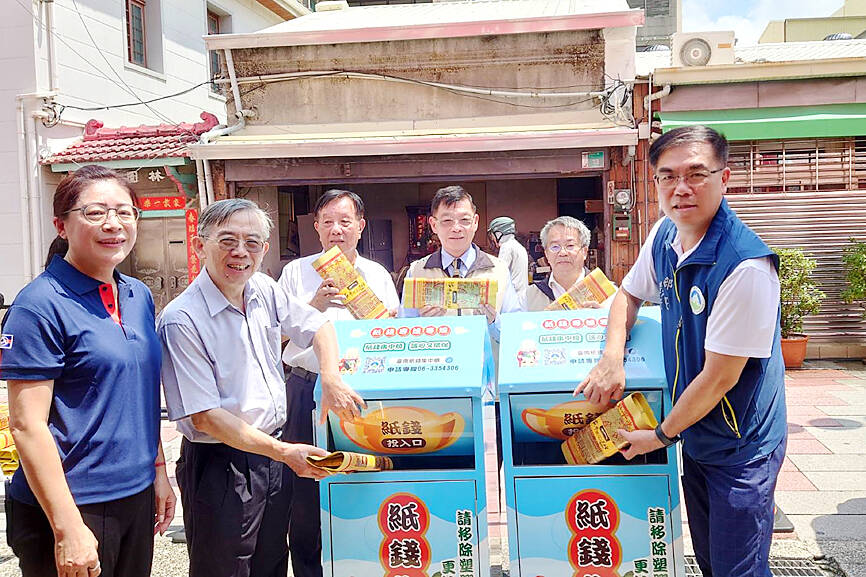Ahead of the Ghost Festival, Minister of Environment Peng Chi-ming (彭啟明) yesterday said the ministry would not ask people not to burn incense or joss paper (also known as ghost money), but would encourage people to do it in more eco-friendly ways.
Peng made the remark at a news conference held with the Tainan City Environmental Protection Bureau in Tainan yesterday, in which the bureau announced that Tainan has installed 19 joss paper collection boxes throughout the city as part of a new policy aimed at promoting centralized burning of the offerings.
The Ghost Festival is on the 15th day of the seventh month of the lunar calendar, which is on Aug. 18 this year, but throughout the seventh month of the lunar calendar, also known as Ghost Month, people prepare ritualistic food offerings and burn incense and joss paper to honor the visiting spirits.

Photo: CNA
“We hope that by collecting joss paper offerings and burning them centrally we can reduce air pollution,” the bureau said.
“We’re encouraging temples to cooperate with this new policy, which would allow people to continue following traditional practice while also taking environmental concerns into consideration,” Peng said.
Bureau Director Hsu Jen-tse (許仁澤) said the city had conducted a trial run of the policy in East District (東區) last year, where it received “an enthusiastic response.”
“This year we are to begin cooperating with PX Mart, who will help collect joss paper from collection boxes installed throughout the city,” he said.
Peng said burning the offerings together in large incinerators would be better for the environment since the incinerators would be equipped with filters and other equipment to reduce air-polluting emissions.
The public would also be encouraged to use “large-denomination” paper money to reduce the number of offerings that would be burned, as well as using offerings made from alternative materials that would emit fewer pollutants when burned, he said.
Separately, the ministry would begin its annual donation drive, accepting donations through any of the major convenience store chains, Peng said.
Those who donate could register their donation online through the ministry’s Web site, where they can enter the names of up to three deceased friends or relatives, he said, adding that the ministry would burn offerings for those individuals on behalf of the donor.
Tiantan Tiangong Temple chairman Hsu Kuo-jen (徐國潤) said that the traditional pudu ceremony, during which offerings are made for the deceased, was rooted in the hopes of the living to show benevolence, accumulate merit and pray for a good afterlife for their ancestors.
“However, over time people came to mistakenly believe that burning more offerings can ensure greater peace and prosperity for one’s family,” he said, adding that centralized burning of offerings was a good way to achieve the original aims of the ceremony in an environmentally friendly way.
Over the past three years, 68,000 tonnes of paper money have been burned at temples for pudu, while the amount of donations made through the annual donation drive has exceeded NT$160 million (US$4.87 million), the minister said.
“Our efforts have reduced the amount of offerings burned by about 1,500 tonnes annually, which amounts to nearly 3,000 tonnes less of emissions,” Peng said. “That is equivalent to the emissions of 2,200 large diesel vehicles driving 50,000 kilometers per year.”
Additionally, nine counties and cities across the country have established environmentally friendly and low-carbon temple certifications, which have already been obtained by 366 temples, he said.

CAUTION: Based on intelligence from the nation’s security agencies, MOFA has cautioned Taiwanese travelers about heightened safety risks in China-friendly countries The Ministry of Foreign Affairs (MOFA) yesterday urged Taiwanese to be aware of their safety when traveling abroad, especially in countries that are friendly to China. China in June last year issued 22 guidelines that allow its courts to try in absentia and sentence to death so-called “diehard” Taiwanese independence activists, even though Chinese courts have no jurisdiction in Taiwan. Late last month, a senior Chinese official gave closed-door instructions to state security units to implement the guidelines in countries friendly to China, a government memo and a senior Taiwan security official said, based on information gathered by Taiwan’s intelligence agency. The

Taiwan Semiconductor Manufacturing Co (TSMC), the world’s largest contract chipmaker, said yesterday that it is looking to hire 8,000 people this year, at a time when the tech giant is expanding production capacity to maintain its lead over competitors. To attract talent, TSMC would launch a large-scale recruitment campaign on campuses across Taiwan, where a newly recruited engineer with a master’s degree could expect to receive an average salary of NT$2.2 million (US$60,912), which is much higher than the 2023 national average of NT$709,000 for those in the same category, according to government statistics. TSMC, which accounted for more than 60 percent

Tung Tzu-hsien (童子賢), a Taiwanese businessman and deputy convener of the nation’s National Climate Change Committee, said yesterday that “electrical power is national power” and nuclear energy is “very important to Taiwan.” Tung made the remarks, suggesting that his views do not align with the country’s current official policy of phasing out nuclear energy, at a forum organized by the Taiwan People’s Party titled “Challenges and Prospects of Taiwan’s AI Industry and Energy Policy.” “Taiwan is currently pursuing industries with high added- value and is developing vigorously, and this all requires electricity,” said the chairman

The National Immigration Agency (NIA) said yesterday that it will revoke the dependent-based residence permit of a Chinese social media influencer who reportedly “openly advocated for [China’s] unification through military force” with Taiwan. The Chinese national, identified by her surname Liu (劉), will have her residence permit revoked in accordance with Article 14 of the “Measures for the permission of family- based residence, long-term residence and settlement of people from the Mainland Area in the Taiwan Area,” the NIA said in a news release. The agency explained it received reports that Liu made “unifying Taiwan through military force” statements on her online